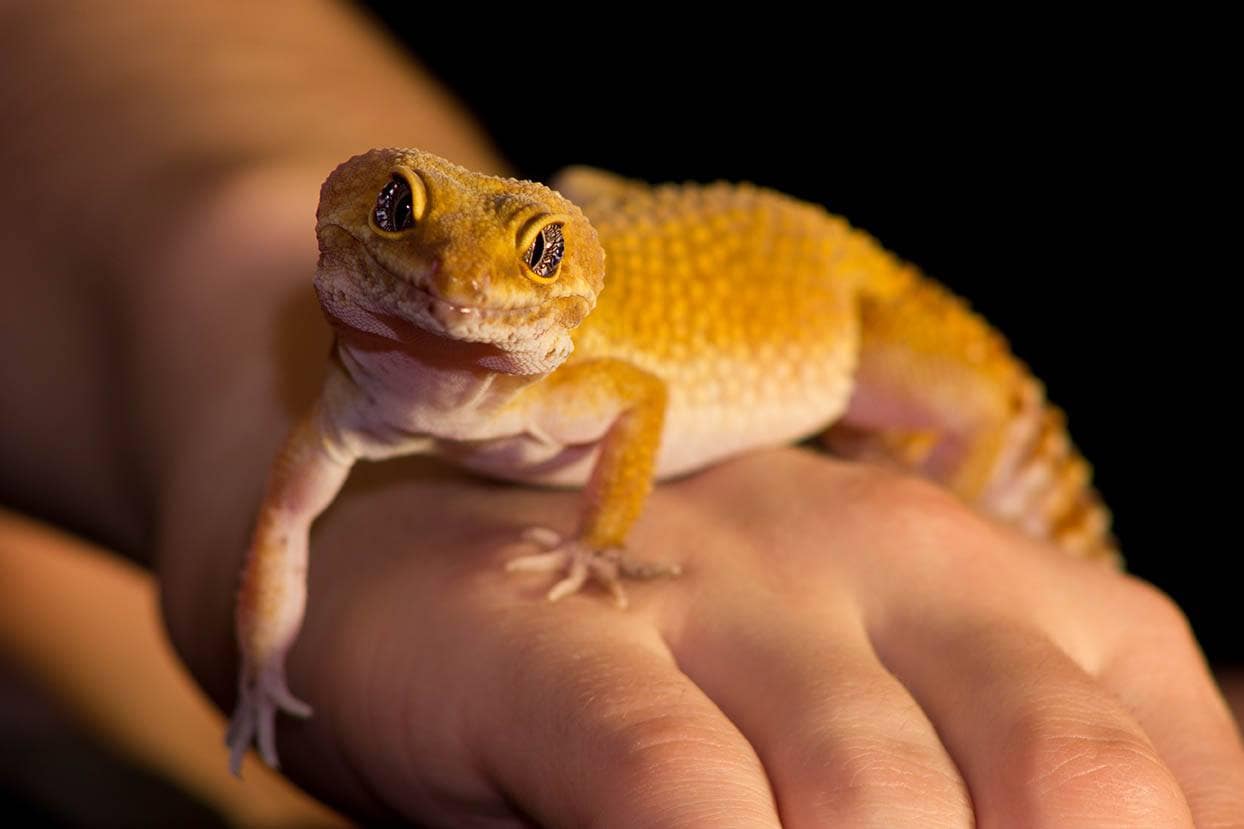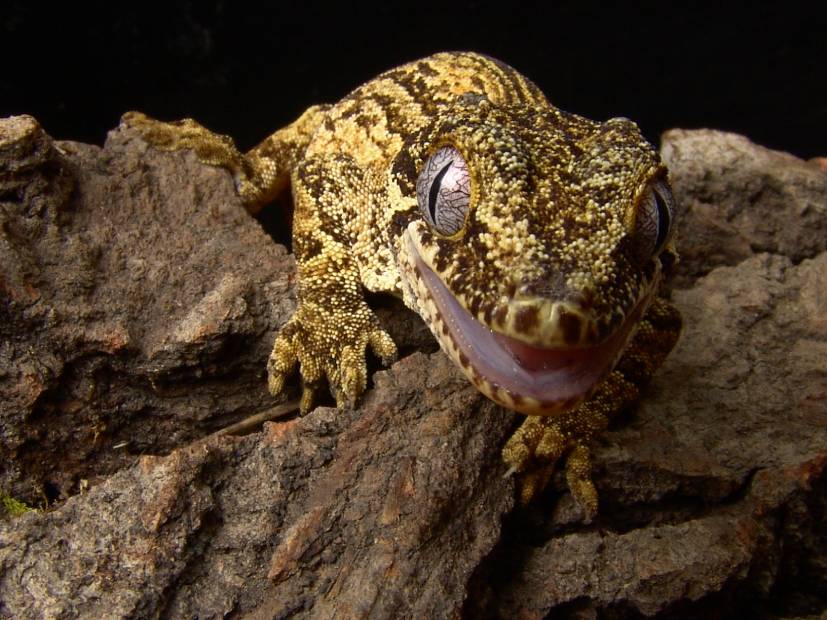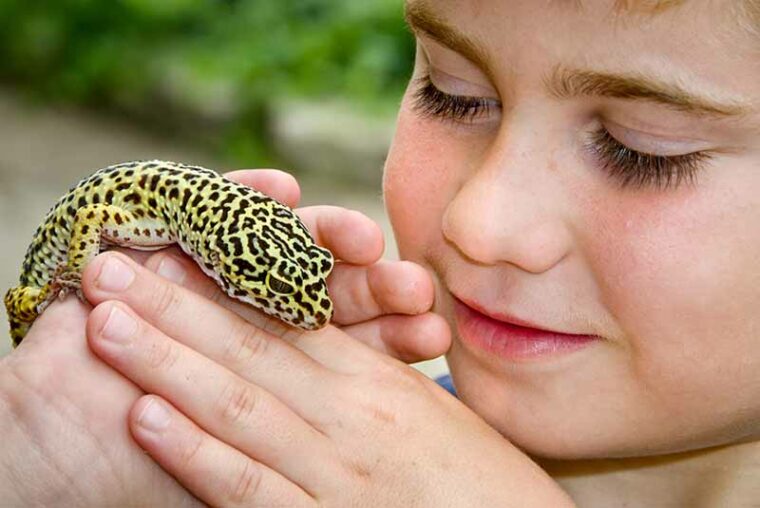
Leopard geckos are a favorite among reptile owners because they are docile, adorable, and more adventurous than some other reptile varieties. Do leopard geckos like to be held, though?
Although leopard geckos tolerate being held much better than other reptiles, they don’t particularly like it. If you take the time to build up trust with your leopard gecko, it won’t be afraid or stressed during the handling experience, but they won’t look forward to it either.
To find out more about why leopard geckos don’t particularly like being handled and the best methods for handling your pet, read on. This article provides a comprehensive guide to handling a leopard gecko.
Do Pet Leopard Geckos Like Being Held?
Unfortunately, leopard geckos do not like being handled. Even if your pet does not run away from you or show any signs of fear, it still does not look forward to the handling experience. At most, leopard geckos are indifferent to being handled.
Although it may be a bit sad to know that your leopard gecko doesn’t like being handled, it is important to note that leopard geckos are much more suitable for handling than other reptiles. If you are patient with your leopard gecko and introduce it to your hand slowly, the gecko will likely not feel any stress or anxiety during the handling process.
In other words, leopard geckos can be trained so as not to hate handling, though they will likely never love it like a dog or cat would.
Why Don’t Leopard Geckos Like to Be Held?

To understand why leopard geckos do not like being held, you have to understand something about reptiles as a whole. Reptiles do not have the ability to form emotional connections like humans, cats, or dogs, though they learn who they can trust.
As a result, leopard geckos do not “like” being handled in the same way that dogs “like” being pet. That is not to say that they hate being handled. It simply means that they do not have an emotional connection to you, which results in an indifference to the handling experience in a best case scenario.
In a worst-case scenario, the leopard gecko can be incredibly stressed whenever it is held. Whenever you first get your leopard gecko, it does not know it is safe with you. As a result, geckos and reptiles can get very stressed out whenever they are held.
Building Trust With Your Leopard Gecko
Even though geckos don’t love being held, you can still handle them without stressing your pet out, but you have to build up trust first. So long as you take special care to be gentle and patient with your leopard gecko, handling your pet can be completely ethical and rewarding, for both you and the gecko.
Slowly Introduce Yourself

The most important thing to do if you want to handle your leopard gecko is to slowly introduce yourself first. Whenever you first get your gecko, it does not yet no you are not a threat. Thus, you don’t want to try handling your gecko just yet. If you try to hold the gecko too soon, it will likely become stressed and hate the experience in the future.
Instead, you want to start by slowly acclimating yourself to the gecko so that the gecko learns you aren’t a threat. Begin by simply feeding the gecko so that it associates you with food.
After that, you can slowly put your hand in the cage, allow the gecko to come to you, and potentially touch its back. If the gecko shows no signs of stress at this point, then you can begin holding it. Start by only holding your gecko for a few minutes and gradually work your way up.
Build Trust With Food
Leopard geckos may be different from dogs in that they don’t particularly like being handled, but they have one critical aspect in common: they love food. Just as you can train dogs to love you and listen to your commands by providing treats, you can build trust with your leopard gecko with food.
Make sure to feed your leopard gecko consistently so that they get into a routine. Once the routine is established, the leopard gecko will associate you with food and know you are not a threat. Once you feel comfortable enough with the leopard gecko, you can even try to hand feed little treats as a surprise.
By giving the leopard gecko treats while it is being handled, it is much more likely to enjoy the handling process. Treats really are the key to just about any animal’s heart.
Let the Gecko Explore
Even though geckos don’t particularly like being held, they do like exploring new areas in a safe environment. So that they associate you with fun and new experiences, you should allow your gecko to explore on their own terms while you are handling them.
For example, you might want to bring the leopard gecko to your bed or some other safe environment during the handling process. These sorts of environments will be new to the gecko, which means they will be excited to explore. At the same time, you know the environment is safe so that the gecko has nothing to worry about.
Create Obstacle Courses
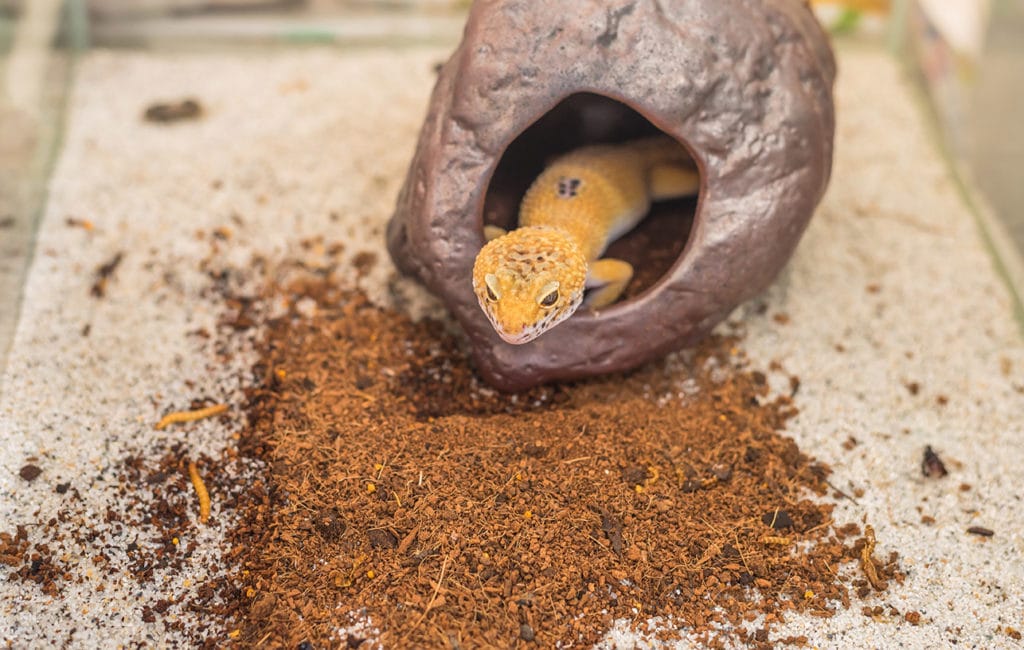
If you really want to go the extra mile for your gecko, try to create an obstacle course for it. You could do this inside the tank or outside the tank. Either way, the obstacle course will challenge your gecko and allow them to associate you with new and fun experiences.
If you want to create an obstacle course inside the tank, simply rearrange the tank’s items. You could also put tunnels and other items inside the tank. For obstacle courses outside of the tank, you don’t need to do anything fancy since the entire experience will be new. You can put little pillows or other items for the gecko to crawl on as they are outside their enclosure.
How to Pick-Up Leopard Geckos
In addition to building trust with your leopard gecko, it is highly important to know how to hold and handle the gecko. Geckos are very delicate creatures. If you are too rough on them, you can easily injure and scare the creature, essentially undoing all the trust building you have done.
Picking-Up the Gecko
To begin picking up your leopard gecko, make sure that there are no signs of stress or anxiety. If your gecko is hiding, drooping its tail, running away, or chirping, it does not want to be handled. Do not force your gecko in your hand if it is already scared.
Once the gecko shows no signs of fear, you can slowly bring your hand to it. Always try to show your hand and avoid sneaking up on the gecko. This allows them to know that they are not being attacked. Pick up the gecko with a scooping motion. Be as gentle as possible so as not to injure the gecko.
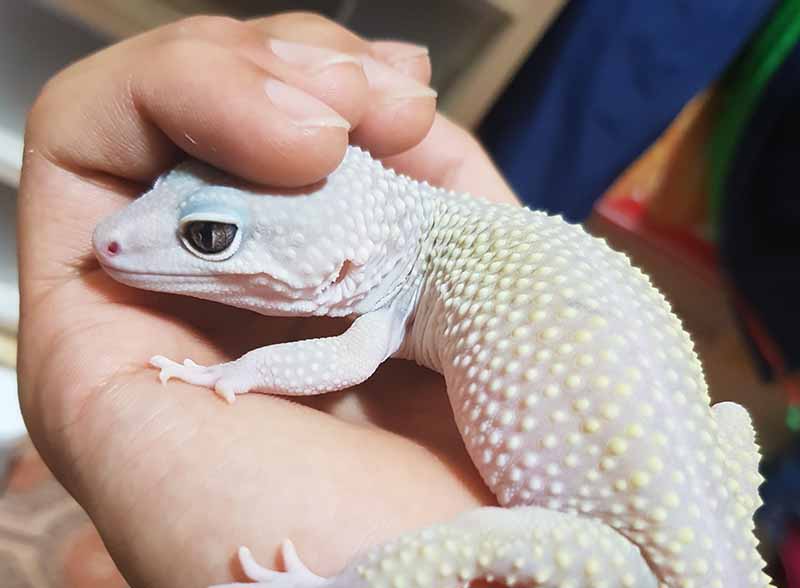
Putting the Gecko Down
While you’re holding your leopard gecko, be gentle but ready to catch it in the case that it should run. Never try to grab the leopard gecko by its tail if it should try to take off. You shouldn’t handle the gecko for more than 15 minutes. After the time is up, slowly lower your hand into the cage and allow the gecko to slide off.
- Related Read: What To Do If Your Leopard Gecko Drops Its Tail
Conclusion
Even though you probably love handling your leopard gecko, the gecko is indifferent to being held in the best-case scenario. If you do not take the time to introduce your hand to the gecko, it could actually be afraid of being held.
For this reason, it’s imperative to build proper trust with your gecko so that it knows it is not in danger when it is being held. Additionally, you need to be gentle and careful when holding the gecko so as not to accidentally hurt it. By being patient and gentle with your gecko, it will likely learn that you are no threat and allow you to hold it without any stress.
- Another interesting article: Do Leopard Geckos Need Baths? Does It Help Them?
Featured Image Credit: Bronwyn Photo, Shutterstock


